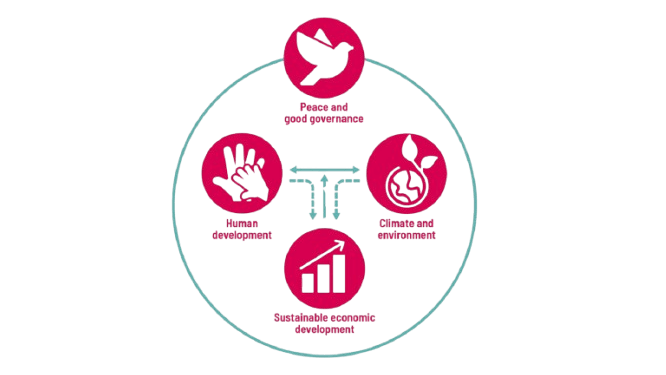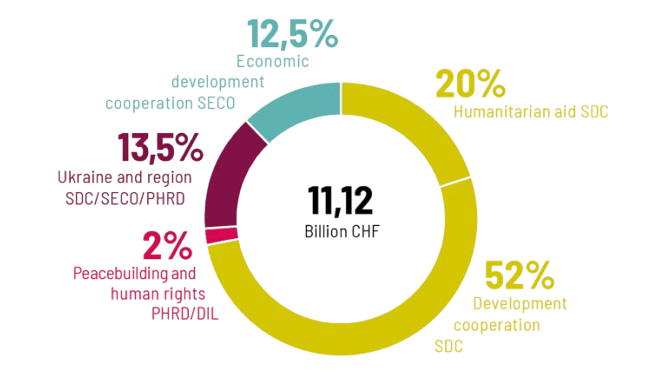Switzerland’s international cooperation strategy 2025-2028
The International Cooperation Strategy 2025-2028 adopted by Parliament in December 2024 sets out Switzerland’s priorities for development and economic cooperation, humanitarian aid and the promotion of peace and human rights. The overarching objective of international cooperation is to end poverty and support sustainable development worldwide. It is an integral part of Swiss foreign and security policy. International cooperation is guided by three principles:
- the needs of the affected / local population;
- the specific added value that Switzerland can contribute;
- Switzerland’s long-term interests (such as a peaceful and just international order, stable and investment-friendly economic conditions, addressing the causes of displacement and irregular migration, and global sustainable development).
Saving lives and ensuring access to basic services; contributing to sustainable economic growth; protecting the environment and combating climate change; promoting peace and human rights, and strengthening democracy and the rule of law. These are the objectives set by Switzerland’s International Cooperation Strategy 2025-2028. It thus continues to focus on the priorities of the previous strategy (2021-2024), thereby ensuring the coherence of Switzerland’s contribution to global sustainable development.
The strategy is implemented by the SDC and the Peace and Human Rights Division (PHRD) of the FDFA and the State Secretariat for Economic Affairs (SECO) of the Federal Department of Economic Affairs, Education and Research (EAER).
International cooperation activities are based on a constitutional and statutory mandate. The International Cooperation Strategy forms part of the Federal Council’s cascading strategy, which strengthens the coherence of Swiss foreign policy and foreign economic policy.
The four international cooperation development objectives for 2025-2028
Switzerland pursues its international cooperation objectives in line with its thematic priorities and promotes gender equality, good governance and respect for human rights in all its activities. The four development objectives of international cooperation are interrelated and mutually reinforcing.
 The four development objectives of Switzerland’s International Cooperation Strategy 2025-2028. — © FDFA
The four development objectives of Switzerland’s International Cooperation Strategy 2025-2028. — © FDFA Human development
Sustainable economic development
Climate change and the environment
Peace and governance
The financial framework of international cooperation for the 2025-2028 period
Parliament has set a maximum financial framework of CHF 11.12 billion for the International Cooperation Strategy 2025-2028 with five commitment appropriations. CHF 1.5 billion is earmarked for supporting Ukraine and CHF 1.6 billion for combating climate change. The actual budget is approved annually by Parliament. Parliament has made CHF 2.4 billion available for 2025.
Even though the war in Ukraine and its consequences have a significant place in this strategy, Switzerland’s humanitarian tradition and its interests require it to maintain its activities in the rest of the world.
 Percentage distribution of the five commitment appropriations for Switzerland’s International Cooperation Strategy 2025-2028. — © FDFA
Percentage distribution of the five commitment appropriations for Switzerland’s International Cooperation Strategy 2025-2028. — © FDFA Links
Dispatch on the International Cooperation Strategy 2025-2028 of 22 May 2024 (DE)
Consultation report on Switzerland’s Strategy for International Cooperation 2025-2028 (DE)
Download
Switzerland’s International Cooperation Strategy 2025-2028 (PDF, 7.03 MB)
Flyer Switzerland’s International Cooperation Strategy 2025-2028 (PDF, 1.80 MB)
Supplementary report Switzerland’s International Cooperation Strategy 2025-2028 (PDF, 476.11 kB)
